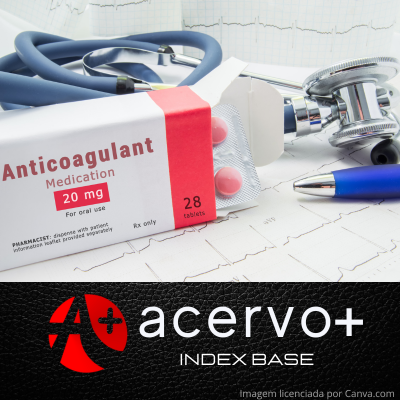O uso dos Anticoagulantes Orais de Ação Direta (DOACs) como terapia anticoagulante na COVID-19
##plugins.themes.bootstrap3.article.main##
Resumo
Objetivo: Identificar os efeitos da utilização dos Anticoagulantes Orais de Ação Direta (DOACs) na infecção pelo SARS-CoV-2 como terapia anticoagulante no curso da doença. Métodos: trata-se de um estudo do tipo revisão integrativa, no qual utilizaram-se as bases de dados: Medical Literature Analysis and Retrievel System Online (MEDLINE/PubMed), Literatura Latino-americana e do Caribe em Ciências da Saúde (LILACS), Índice Bibliográfico Espanhol em Ciências da saúde (IBECS) e Scientific Electronic Library Online (SciELO), com os seguintes descritores, em ciências da saúde (DEcS): ”(Covid OR long Covid OR post Covid OR Post-Acute COVID-19 Syndrome) AND Factor Xa Inhibitors”. Utilizou-se como pergunta norteadora: os DOACs podem ser usados de forma segura no contexto da infecção pela COVID-19 como terapia anticoagulante? Resultados: A amostra final foi composta por 15 artigos os quais evidenciaram efeitos adversos bem como resultados otimistas a respeito do uso de DOACs na COVID-19. Considerações finais: DOACs parecem ser vantajosos a nível ambulatorial, porém restam dúvidas quanto às possíveis interações medicamentosas indesejáveis.
##plugins.themes.bootstrap3.article.details##
Copyright © | Todos os direitos reservados.
A revista detém os direitos autorais exclusivos de publicação deste artigo nos termos da lei 9610/98.
Reprodução parcial
É livre o uso de partes do texto, figuras e questionário do artigo, sendo obrigatória a citação dos autores e revista.
Reprodução total
É expressamente proibida, devendo ser autorizada pela revista.
Referências
2. ALHAWITI NM, et al. Clinical Outcomes of Anticoagulant Therapy in COVID-19 Patients with Pre-Existing Cardiovascular Diseases: A Systematic Review. Infect Drug Resist. 2023;16:3767-3775.
3. ALY R, et al. The use of direct acting oral anticoagulants in patients with COVID-19 infection. J Community Hosp Intern Med Perspect. 2021;11(2):184-186.
4. ASLAN B, et al. The effect of chronic DOAC treatment on clinical outcomes of hospitalized patients with COVID-19. Int J Clin Pract. 2021;75(9):e14467.
5. AVEZUM A, et al. Rivaroxaban to prevent major clinical outcomes in non-hospitalised patients with COVID-19: the CARE–COALITION VIII randomised clinical trial. EClinicalMedicine, v. 60, 2023.
6. BISTROVIC P, et al. Risks associated with prior oral anticoagulation use in hospitalized COVID-19 patients - A retrospective cohort study on 5392 patients from a tertiary centre. Int J Cardiol. 2023;372:144-149.
7. BUENEN AG, et al. Prior use of anticoagulation is associated with a better survival in COVID-19. J Thromb Thrombolysis. 2021;52(4):1207-1211.
8. CONNORS JM, LEVY JH. COVID-19 and its implications for thrombosis and anticoagulation. Blood. 2020;135(23):2033-2040.
9. FLAM B, et al. Direct oral anticoagulant use and risk of severe COVID-19. J Intern Med. 2021;289(3):411-419.
10. GATTO MC, et al. Efficacy and Safety of Anticoagulant Therapy in COVID-19-Related Pulmonary Embolism with Different Extension. Biomedicines. 2023;11(5):1282.
11. HELMS J, et al. High risk of thrombosis in patients with severe SARS-CoV-2 infection: a multicenter prospective cohort study. Intensive Care Med. 2020;46(6):1089-1098.
12. HESS R, et al. Proportion of Patients on Warfarin Therapy Who Are Eligible for Conversion to a Direct Oral Anticoagulant in the Setting of COVID-19. Ann Pharmacother. 2023;57(8):918-924.
13. HOZAYEN SM, et al. Outpatient and inpatient anticoagulation therapy and the risk for hospital admission and death among COVID-19 patients. EClinicalMedicine. 2021;41:101139.
14. KRAVCHENKO OV, et al. Drug-drug interaction between dexamethasone and direct-acting oral anticoagulants: a nested case-control study in the National COVID Cohort Collaborative (N3C). BMJ Open. 2022;12(12):e066846.
15. MOTLOCH LJ, et al. Early antithrombotic post-discharge therapy using prophylactic DOAC or dipyridamole improves long-term survival and cardiovascular outcomes in hospitalized COVID-19 survivors. Front Cardiovasc Med. 2022;9:916156.
16. PANAHI L, et al. Review of Medical Therapies for the Management of Pulmonary Embolism. Medicina (Kaunas). 2021;57(2):110.
17. POPA P, et al. Mortality Rate in Upper Gastrointestinal Bleeding Associated with Anti-Thrombotic Therapy Before and During Covid-19 Pandemic. J Multidiscip Healthc. 2022;15:2679-2692.
18. POTERE N, et al. Direct oral anticoagulant plasma levels in hospitalized COVID-19 patients treated with dexamethasone. J Thromb Thrombolysis. 2022;53(2):346-351.
19. RIVERA-CARAVACA JM, et al. Chronic Oral Anticoagulation Therapy and Prognosis of Patients Admitted to Hospital for COVID-19: Insights from the HOPE COVID-19 Registry. Int J Clin Pract. 2022;2022:7325060.
20. RIVERA-CARAVACA JM, et al. Direct-acting oral anticoagulants use prior to COVID-19 diagnosis and associations with 30-day clinical outcomes. Thromb Res. 2021;205:1-7.
21. RIVERA-CARAVACA JM, et al. Efficacy and safety of direct-acting oral anticoagulants compared to vitamin K antagonists in COVID-19 outpatients with cardiometabolic diseases. Cardiovasc Diabetol. 2021;20(1):176.
22. ROGULJIĆ H, et al. The role of direct oral anticoagulants in the era of COVID-19: are antiviral therapy and pharmacogenetics limiting factors?. Croat Med J. 2022;63(3):287-294.
23. SCHUTGENS RE. DOAC in COVID-19: Yes or No?. Hemasphere. 2020;5(1):e526.
24. SMYTHE MA, et al. Potential Dexamethasone-Direct Oral Anticoagulant Drug Interaction: Is This a Concern in COVID?. Ann Pharmacother. 2022;56(3):319-329.
25. TANG N, et al. Abnormal coagulation parameters are associated with poor prognosis in patients with novel coronavirus pneumonia. J Thromb Haemost. 2020;18(4):844-847.
26. TESTA S, et al. Switch from oral anticoagulants to parenteral heparin in SARS-CoV-2 hospitalized patients. Intern Emerg Med. 2020;15(5):751-753.

